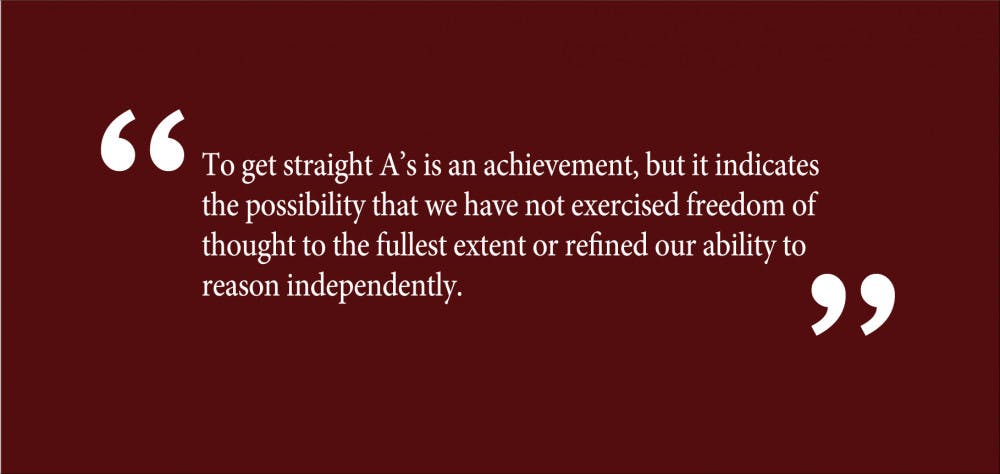Nearly anyone on campus would hesitantly admit that it is common to sacrifice learning to obtain A’s in class. Even those who deeply desire to learn will often constrain themselves to get good grades, especially due to pressure from top graduate schools and employers that offer the promise of status and wealth. We ought to pursue excellence, but getting straight A’s must not be our primary aim. We must be bolder: We must reclaim our education by prioritizing truth and knowledge over A’s.
The primary reason we must not pursue straight A’s at the expense of learning is human fallibility. Firstly, as students, we are fallible and must accept that in order to learn anything of significance we must constantly investigate ideas, even ideas that seem at first glance to be taboo, in our academic work. Adhering to this process means that we will get some things wrong and perhaps even get lower grades. However, we learn much more from an imperfect paper than a perfect one; it should thus be our goal to master new and foreign ideas, not just to consolidate our grasp on ideas we have already mastered.
Secondly, our professors are among those with the most knowledge in their fields, but even they will be incorrect some of the time. That means that even if we students were correct 100 percent of the time (and we certainly are not), our grades might not reflect our perfection due to the fallibility of our professors. In other words, if professors are correct 90 percent of the time, we should expect our grades to reflect our perfection only 90 percent of the time. Because of this fallibility, if we were too expediently prioritize good grades over the pursuit of truth, we would be hindering our learning.
Instead, we must have a deep respect for our professors, but not an unquestioning one. Seeking truth requires us to be fallible both by exposing our false beliefs and by accepting the fallibility of professors when we are graded imperfectly, even though neither of these practices is conducive to getting straight A’s. In fact, achieving straight A’s may well stunt the development of the mind’s capacity for independent thought, as it is most often through taking intellectual risks that we learn. In prioritizing the process of learning above an obsession with hitting the “A-threshold,” we give up our attempts to control our grades, but we gain the freedom to think for ourselves.
The implications of sacrificing learning for A’s are twofold. We use the open curriculum to avoid classes that appear challenging, and we also narrow our pursuits in class to conform to what we believe our professors want. In both processes, the potential for intellectual development is stifled. While professors’ expertise can direct us toward important ideas in a given field, we miss a crucial opportunity to expand our minds if we conform our academic work to their personal views and do not question them. If we further restrict our opportunities to learn, we build our own cage instead of removing the power that grades have over us by conquering it or, better still, not recognizing that power in the first place.
Secondly, prioritizing good grades turns us into sycophants trained to follow authority, restricting our full participation in democracy. In order to become citizens that solve the problems facing our society, we must first build and sustain our capacity for independent thought, which does not come naturally. We must consistently act on our freedom of thought in class or else let it atrophy.
But it would be imprudent to ignore the pressures that contribute to the prioritization of good grades over learning in the first place. Perhaps the most important challenge is the pressure to receive A’s to impress top graduate schools and employers, a habit introduced to many of us in the college admissions process. All societies form metrics by which to collectively judge how to distribute limited resources like acceptances, and ours is no different. In our meritocracy, grades and test scores — including, in theory, a person’s background — are privileged over other metrics such as extracurricular involvement.
Perhaps the intention to measure the quality of our work is sound, but it is rather dubious that grades and test scores best measure our knowledge and dedication to the pursuit of truth. Instead, we must call for a cultural shift by forming a détente among ourselves in the arms race for good grades and collectively urge graduate schools and employers to evaluate our knowledge and character, not our grades and test scores.
As a first step in this shift, we can call on these institutions to evaluate our writing samples and projects instead of our grades. This would require institutions such as graduate schools to pay less attention to their institutional ranking, which is largely derived from student GPA and test scores. It would be a challenge to change the admissions process, but with our insistence they could make this shift. We must also make haste, for the quality of our education, intellectual development and democracy is at stake.
To get straight A’s is an achievement, but it indicates the possibility that we have not exercised freedom of thought to the fullest extent or refined our ability to reason independently. We should not allow our desires for admission and employment to cheapen and mangle our education until it is no longer recognizable. If we hollow out our education by making it secondary to our grades, we hollow out our lives; as Seneca wrote, “Life disappears into an abyss, and there is no benefit in pouring in any amount of water, if a vessel has no bottom to contain it.”
Brendan Sweeney ’20 can be reached at brendan_sweeney@brown.edu. Please send responses to this opinion to letters@browndailyherald.com
and other op-eds to opinions@browndailyherald.com.





